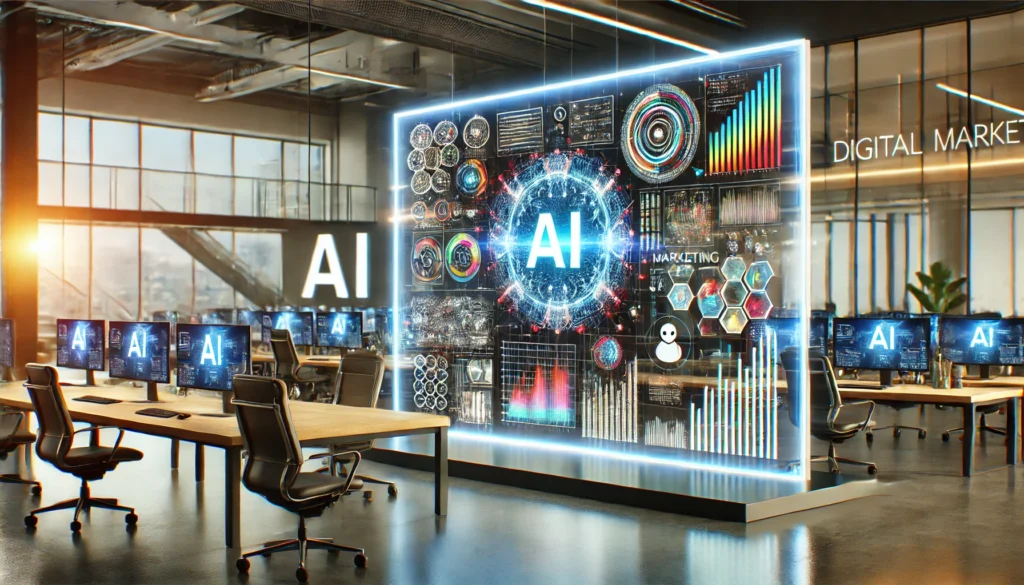Enhancing Campaigns and Boosting ROI

In today’s highly competitive digital landscape, marketers are constantly seeking innovative ways to enhance their campaigns and maximize their return on investment (ROI). Artificial Intelligence (AI) has emerged as a game-changer in the realm of digital marketing, providing marketers with powerful tools to better understand their audiences, predict future trends, and automate tasks. This article explores how AI is revolutionizing digital marketing, offering businesses the opportunity to optimize their strategies, engage more effectively with customers, and ultimately drive higher ROI.
Understanding the Role of AI in Digital Marketing
AI-Driven Marketing Strategies for Improved Campaign Performance
Predictive Analytics: Anticipating Market Trends and Consumer Behavior
Enhancing Customer Engagement Through Personalization
AI Tools for Marketing Automation and Efficiency
Optimizing ROI with AI-Powered Marketing Tools
Challenges of Implementing AI in Digital Marketing
Future Trends: The Growing Influence of AI in Marketing
Comprehending the Impact of AI on Digital Marketing
Artificial Intelligence has reshaped the landscape of digital marketing by providing new methods for data analysis, customer segmentation, and predictive modeling. AI technologies such as machine learning, natural language processing, and computer vision enable marketers to process vast amounts of data in real-time, allowing for more informed decision-making. By leveraging AI, businesses can gain deep insights into customer behavior, preferences, and buying patterns, leading to more targeted and effective marketing campaigns
AI-Driven Marketing Strategies for Improved Campaign Performance
AI-driven marketing strategies allow businesses to analyze consumer data more precisely, leading to highly personalized and relevant campaigns. These strategies utilize AI algorithms to categorize audiences according to different criteria, including demographics, browsing habits, and purchasing history. As a result, marketers can create customized content that resonates with specific audience segments, leading to higher engagement rates and conversions. For example, AI-powered email marketing tools can automatically tailor content for individual recipients, increasing open and click-through rates
Predictive Analytics: Forecasting Market Trends and Understanding Consumer Behavior
Predictive analytics, powered by AI, is a valuable tool for marketers to anticipate future market trends and consumer behavior. By analyzing historical data, AI algorithms can forecast future buying patterns, helping marketers to adjust their strategies accordingly. This approach not only reduces the risk of marketing efforts falling flat but also ensures that businesses are prepared to meet the evolving demands of their customers. Predictive analytics also enables dynamic pricing strategies, where prices can be adjusted in real-time based on consumer demand and competitor actions
Enhancing Customer Engagement Through Personalization
Personalization is a critical factor in driving customer engagement, and AI has made it easier than ever to deliver highly customized experiences. AI-powered tools can analyze user data to determine the best content, offers, and messages for each customer. For instance, AI algorithms can suggest products that align with a customer’s past purchases or browsing behavior, resulting in a more relevant shopping experience. This level of personalization fosters stronger customer relationships, enhances loyalty, and increases the likelihood of repeat purchases
AI Tools for Marketing Automation and Efficiency
AI is also having a profound effect on marketing automation. AI tools can automate repetitive tasks such as email marketing, social media posting, and ad management, freeing up valuable time for marketers to focus on strategic planning and creative development. Automated chatbots, powered by AI, provide instant customer support, answer queries, and guide users through the purchasing process, enhancing customer satisfaction and conversion rates. These AI-driven tools not only improve efficiency but also reduce the margin for human error
Optimizing ROI with AI-Powered Marketing Tools
One of the primary goals of digital marketing is to achieve a high ROI, and AI tools are essential for optimizing marketing spend. AI can analyze the performance of various campaigns in real-time, identify which strategies are most effective, and recommend adjustments to improve outcomes. For example, AI-driven ad platforms can automatically allocate budgets to high-performing ads, ensuring optimal use of resources. By providing detailed insights into campaign performance, AI helps marketers make data-driven decisions that boost ROI
Challenges of Implementing AI in Digital Marketing
Despite its numerous benefits, implementing AI in digital marketing comes with its own set of challenges. Data privacy concerns, integration issues with existing marketing tools, and the need for skilled professionals to manage AI technologies are some of the hurdles businesses face. However, as AI continues to evolve, these challenges are being addressed through advancements in technology, better regulations, and increased education and training for marketers
Future Trends: The Growing Influence of AI in Marketing
As AI technology continues to advance, its influence on digital marketing will only grow. Future trends may include more sophisticated AI algorithms for hyper-personalization, enhanced predictive analytics for even more accurate forecasting, and greater integration of AI in virtual and augmented reality experiences. Businesses that embrace these advancements will be better positioned to stay ahead of the competition, build stronger customer relationships, and achieve sustained growth in the digital age
Conclusion
Artificial Intelligence is undeniably transforming digital marketing by enabling more precise targeting, personalization, and automation. Businesses that leverage AI tools effectively can enhance their marketing campaigns, engage customers more deeply, and achieve a higher ROI. While challenges remain in implementing AI, the potential benefits far outweigh the drawbacks, making it a critical investment for forward-thinking marketers. As we look to the future, AI’s role in digital marketing will only become more prominent, driving innovation and success across the industry